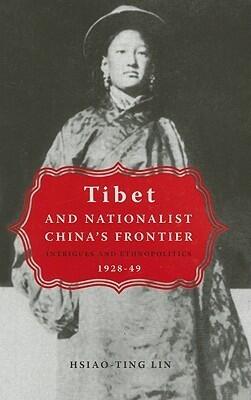
Tibet and Nationalist China's Frontier: Intrigues and Ethnopolitics, 1928-49
par
Hsiao-ting Lin
Pas encore d'évaluations
History
Format
Relié
Pages
304
Langue
Anglais
Publié
Oct 6, 2006
Éditeur
UBC Press
ISBN-10
0774813016
ISBN-13
9780774813013
Description
Hsiao-ting Lin presents an insightful exploration of the intricate relationship between Tibet and Nationalist China from 1928 to 1949. This comprehensive analysis delves into the geopolitical maneuverings and ethnopolitical dynamics that shaped the region during a time of significant transformation. The author meticulously examines the various actors involved, including local authorities, Tibetan leaders, and Nationalist forces, highlighting their motivations and the impact of their interactions.
Lin's work reveals how the interplay of nationalist aspirations, ethnic identities, and cultural narratives influenced policy decisions and territorial claims. The book navigates through a series of key events, illustrating how Tibet emerged as a focal point of intrigue and strategic importance within Nationalist China's broader agenda. The narrative unfolds against a backdrop of shifting alliances and emerging tensions, providing readers with a nuanced understanding of the era's complexities.
The author also pays close attention to the voices of the Tibetan people, shedding light on their experiences and perspectives within the context of larger political shifts. Lin’s analysis not only enriches the history of Tibet but also offers critical insights into the formation of modern Chinese identity and national boundaries.
By synthesizing a wealth of primary sources and employing a multidimensional approach, Lin challenges existing narratives and invites readers to reconsider the significance of Tibet in the historical framework of Nationalist China. This work stands as an essential contribution to the fields of history, ethnopolitics, and Chinese studies, offering a compelling look at a pivotal era marked by conflict, ambition, and cultural interchange.
Lin's work reveals how the interplay of nationalist aspirations, ethnic identities, and cultural narratives influenced policy decisions and territorial claims. The book navigates through a series of key events, illustrating how Tibet emerged as a focal point of intrigue and strategic importance within Nationalist China's broader agenda. The narrative unfolds against a backdrop of shifting alliances and emerging tensions, providing readers with a nuanced understanding of the era's complexities.
The author also pays close attention to the voices of the Tibetan people, shedding light on their experiences and perspectives within the context of larger political shifts. Lin’s analysis not only enriches the history of Tibet but also offers critical insights into the formation of modern Chinese identity and national boundaries.
By synthesizing a wealth of primary sources and employing a multidimensional approach, Lin challenges existing narratives and invites readers to reconsider the significance of Tibet in the historical framework of Nationalist China. This work stands as an essential contribution to the fields of history, ethnopolitics, and Chinese studies, offering a compelling look at a pivotal era marked by conflict, ambition, and cultural interchange.
Avis
Aucun avis pour le moment
Soyez le premier à donner votre avis sur ce livre et partagez vos pensées
Ajouter le premier avisJournal de lecture
Aucun journal de lecture trouvé
Commencez à suivre vos progrès de lecture pour voir les journaux ici
Ajoutez votre premier journal de lectureNotes
Journal des transactions
Aucun journal de transactions trouvé
Commencez à suivre vos transactions de livres pour voir les journaux ici
Ajoutez votre premier journal de transactions


















